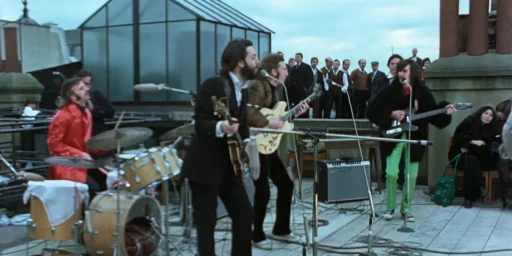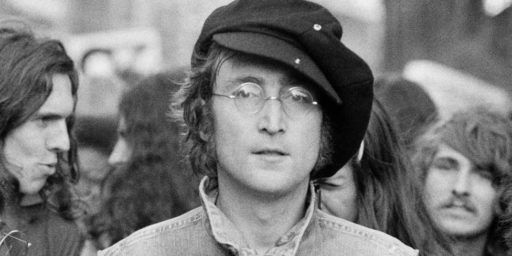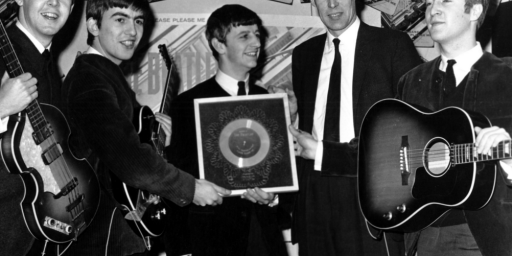McCartney Divorce Settlement
Reflecting on the Paul McCartney-Heather Mills divorce settlement, Alex Massie, blogging from the other side of the Pond, observes,
Isn’t £24m pretty fair compensation for having endured Sir Paul McCartney for four years. It works out at £16, 427 a day which, as a per diem, seems quite reasonable…
(Of course if you take the view that she is but a gold-digger, then McCartney can reflect that £24m to tell her where to hop-off is money well spent.)
Quite. Heather’s certainly improved her pre-Paul lifestyle enormously for her four year investment, certainly more so than, say, the return on a University education. And £24m is barely more than nuisance money to Sir Paul.
The whole controversy immediately reminds me of how the Beatles changed their tune on the issue of money as their personal status changed. In their leanest days, before fames hit, they covered Berry Gordy and Janie Bradford’s “Money,” which put forth the cynical view that,
- Your lovin’ gives me a thrill
But your lovin’ don’t pay my bills
Now give me money
That’s what I want
In 1964’s “Can’t Buy Me Love,” one of McCartney’s infamous Silly Love Songs, we see a wistfulness:
- I may not have a lot to give but what I got I’ll give to you
I don’t care too much for money, money can’t buy me love
In “All You Need Is Love,” written when McCartney and his songwriting partner John Lennon were wealthy and newly married, they inform us that,
- There’s nothing you can make that can’t be made.
No one you can save that can’t be saved.
Nothing you can do but you can learn how to be in time
It’s easy.
All you need is love, all you need is love.
Presumably, hallucinogenics drugs also contributed to this newfound economic consciousness.
Toward the end, with 1969’s Abbey Road, however, the message was much more cryptic. In “You Never Give Me Your Money,” McCartney foreshadows today’s events:
- You never give me your money
You only give me your funny paper
and in the middle of negotiations
you break down
I’m not sure how much Sir Paul’s views evolved during the Wings era and thereafter. Economic commentary seems not to have been as strongly featured in them, as I can’t recall any post-Beatles hits with that theme.






I can’t recall any post-Beatles hits with that theme
Other than “Live and Let Die”, can you recall a post-Beatles hit involving Wings regardless of theme? For that matter, can you recall any other genuine hit involving McCartney between The Beatles and “Ebony & Ivory”?
He broke the charts here and there but, really, Wings is mostly a bad dream.
The changed attitudes towards filthy lucre were already evident on 1965’s “Taxman.”
I’m missing the “economic consciousness” in that lyric…
Perhaps I’m taking “All” too literally but I’ve always regarded it as an anti-materialistic message.
In “Money,” we’re told that money’s value trumps that of love, which is merely thrilling but doesn’t pay the bills. In “Love is All You Need,” though, that consideration no longer applies.
Actually, while John Lennon earned far more critical acclaim, McCartney had a slew of hits. Billboard:
There were quite a few big ones on “Band on the Run” alone.
Memorable post-Beatles McCartney songs.
Maybe I’m Amazed
Band on the Run
Uncle Albert/Admiral Halsey
Heart of the Country
Listen to What the Man Said
Silly Love Songs
My Love
Junior’s Farm
With a Little Luck
Jet
Coming Up
This is what I came up with off the top of my head.
I agree as to the anti-materialistic message, but why, when that matches the earlier stuff, would you then call that a newfound economic consciousness?
Seems like you should lump in “All you need is Love” with the earlier works and single out “Money” as indicating a change in position.
I’m embarrassed to share a name with that woman. She was pouty about her four-year-old child receiving only 70k per year for merely existing.
What I read out of that is that Ms. Mills won’t use any of her own money to alleviate said sadness. I didn’t know whether to laugh or cry – is it really possible to be greedy after receiving 24.3 million pounds? I guess so.
hln
Wingles.
There were quite a few big ones on “Band on the Run†alone.
I guess I’ve been blocking all of that out. I stand corrected.
Actually, gang, there’s a reason why Post-Beatles Mccartney never came up with another money song. Indded, more than one. First, he wasnt worried about it anymore being bloody well rich himself, and anyway, the one who was far more concerned about money was John… the socialist of the group.